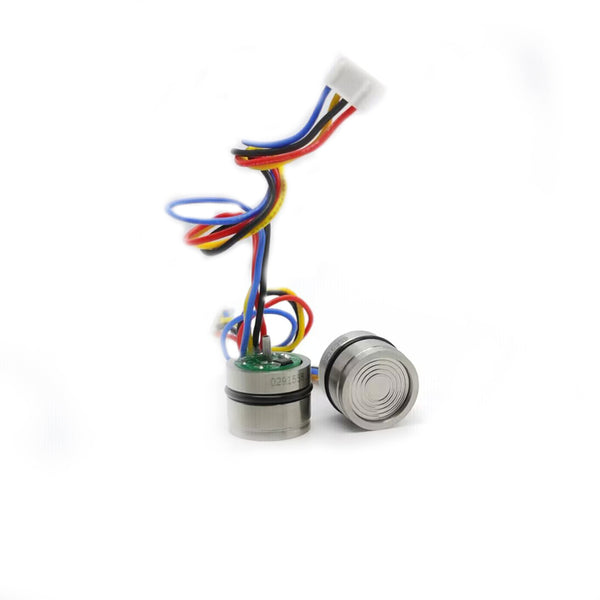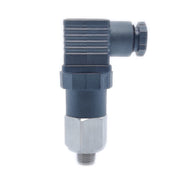Pressure sensors are vital in our modern world, playing a key role in various industries and daily life. They measure and monitor pressure in numerous environments, from the depths of the ocean to the vacuum of space. These sensors ensure safety in vehicles by monitoring tire pressure and in industrial settings by keeping an eye on gas and liquid pressures. They also contribute significantly to medical advancements, helping monitor critical health parameters. Their accuracy and reliability make them indispensable in ensuring efficient operations and safety across different sectors.
What is pressure sensor?
A pressure sensor is a handy device that measures pressure, often of gases or liquids. Think of it like a sensitive electronic ear that listens to the force exerted by these substances. It converts this force into an electrical signal, letting us read the pressure easily. This tool is super useful in various fields, from monitoring car tire pressure to controlling industrial machines. It's like a tiny guardian, ensuring everything operates safely and efficiently. Simple yet powerful, these sensors play a big part in our daily technology, making complex tasks easier and safer.
How does Pressure Sensor Work?
A tool for measuring the pressure of liquids or gases is a pressure sensor. Think of it as a sophisticated gauge that translates physical force into an electrical signal. They are incredibly useful in various applications, from industrial machinery to everyday household items.
How these sensors work. The core function of a pressure sensor is to measure the force exerted over a certain area. This force could come from air, water, or any other medium. The sensor then translates this force into an electrical signal, which we can read and interpret.
There are several types of pressure sensors, each suited for different scenarios. Piezoelectric sensors, for example, use materials like quartz. When pressure is applied to these materials, they generate an electrical charge. This makes them ideal for high-pressure environments.
Strain gauge sensors are another common type. They work by measuring the deformation of a material under pressure. As the material deforms, its electrical resistance changes. The sensor detects this change and converts it into an electrical signal.
Capacitive sensors are a bit different. They have two conductive plates separated by a gap. When pressure changes, the capacitance between these plates changes too. The sensor measures this change to determine the pressure.
You might wonder, where do we use these sensors? Well, they're all around us! In your car, they monitor tire pressure to keep you safe on the road. At home, they help regulate the gas flow in your heating system. In the industrial world, they are vital for monitoring and controlling processes, ensuring everything runs smoothly and safely.

What is the benefit of pressure sensor?
Pressure sensors are valuable tools in various industries and everyday life. Let's explore their benefits in detail:
Enhanced Safety
Pressure sensors are essential for maintaining security. In vehicles, they monitor tire pressure, helping prevent accidents due to under-inflated tires. In industrial settings, they monitor systems like gas pipelines, preventing leaks and explosions.
Improved Efficiency
These sensors optimize processes by providing precise pressure measurements. For example, in HVAC systems, they help maintain the right pressure levels, ensuring efficient heating and cooling.
Cost-Effective Maintenance
By monitoring pressure in machinery, these sensors can predict maintenance needs. This proactive approach helps avoid costly breakdowns and extends the lifespan of equipment.
Environmental Monitoring
Pressure sensors are vital in environmental research. They help track atmospheric changes, contributing to weather forecasting and climate research.
Medical Advancements
In the medical field, pressure sensors are lifesavers. They monitor blood pressure and respiratory functions, playing a key role in patient care and surgical procedures.
Automated Control
In automated systems, pressure sensors provide critical feedback. This feedback ensures machines operate within safe and efficient pressure ranges, enhancing overall system control.
Quality Assurance
In manufacturing, they ensure products meet quality standards. For instance, in food packaging, they check that containers are sealed correctly, maintaining food safety.
Energy Savings
By optimizing the pressure in systems, these sensors contribute to energy efficiency. This not only saves costs but also benefits the environment by reducing energy consumption.
Space Exploration
Pressure sensors are also stars in space exploration. They monitor conditions inside spacecraft, ensuring astronaut safety and mission success.
Water Management
In water treatment and distribution, they maintain optimal pressure in pipes. This helps prevent leaks and ensures efficient water supply to communities.
Consumer Electronics
In smartphones and wearable devices, miniaturized pressure sensors help track altitude and weather changes, enhancing user experience.
Agricultural Efficiency
They also aid in agriculture, monitoring soil and atmospheric conditions. This information helps farmers make informed decisions, improving crop yields.
Research and Development
Pressure sensors are essential in R&D. They provide precise data, aiding in the development of new technologies and materials.
Pressure sensors offer numerous benefits across different sectors. They enhance safety, improve efficiency, contribute to environmental conservation, and much more.
Types of Pressure Sensors
Pressure sensors come in various types, each designed for specific uses. Let's explore the main types to understand how they differ and where we use them.
Piezoelectric Sensors
These sensors use materials like quartz that produce an electric charge under pressure. They excel in high-pressure environments, making them ideal for industrial and automotive applications.
Strain Gauge Sensors
These sensors measure the deformation of a material when pressure applies. They work by detecting changes in electrical resistance, which makes them highly accurate. You'll find them in machinery and electronic devices.
Capacitive Sensors
These have two conductive plates with a gap in between. Pressure changes alter the capacitance, which the sensor measures. They're great for sensitive measurements, like in laboratory equipment.
Optical Sensors
Optical sensors use light to measure pressure. They're immune to electromagnetic interference, making them suitable for environments with high electromagnetic fields, like MRI rooms.
Potentiometric Sensors
These sensors measure the voltage across a resistor. They are simple, cost-effective, and often used in consumer electronics and automotive systems.
What is the best pressure sensor?
The best pressure sensor depends on your specific needs and application. For reliable options, consider checking out xidibei.com. They offer a wide range of sensors, each tailored to different requirements. Whether you need a sensor for industrial, automotive, or medical applications, they have you covered. Look for features like accuracy, durability, and compatibility with your system. Remember, the best sensor for you will align with your specific requirements, whether it's for precise measurements in delicate environments or rugged use in industrial settings.



Leave a comment